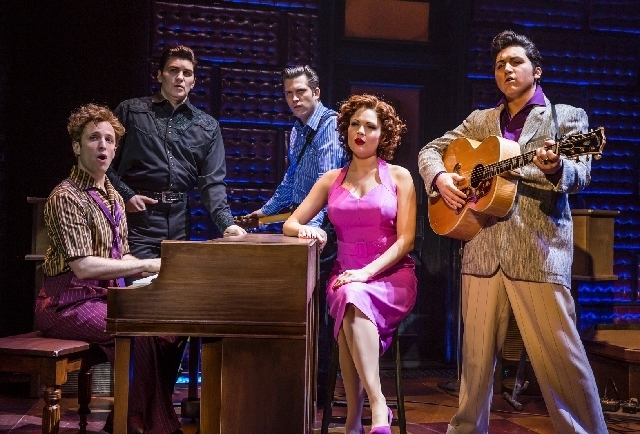‘Million Dollar Quartet’ just plain cool

Two kinds of history lessons are at work in “Million Dollar Quartet.” One for those who never knew, and the other for those who maybe forgot.
The Broadway hit may be the first time you learn about Sun Records and the fabled day in 1956 when Elvis Presley, Johnny Cash, Jerry Lee Lewis and Carl Perkins gathered for a Memphis, Tenn., jam session.
Those who came of age in the early-rock era are a presold audience for this jukebox musical, now parked at Harrah’s Las Vegas for an open-ended run. And younger folks will listen without prejudice.
But for those of us in the middle, the first song, “Blue Suede Shoes,” is a revelation of why we should care.
Other late-era baby boomers may understand why it’s high praise to say you will hear that song — as well as “Great Balls of Fire,” “Hound Dog” and, yes, “See You Later Alligator” — as if for the first time, perhaps the way teenagers did in the 1950s.
Those of us in the middle are the ones who saw ’50s rock ruined by “Happy Days,” the aged legends themselves working at half speed, or idiotic theme park revues echoed recently in Cirque du Soleil’s “Viva Elvis,” where people in primary colors danced around on, yes, a giant blue suede shoe.
But here at this facsimile of the Sun studio? The electric guitar crackles with barely harnessed power, and the doghouse bass and drums summon the hellfire demons Jerry Lee (Martin Kaye) warns us about: “We all know what rock ’n’ roll means: temptation, fornication and damnation — in that order.”
In short, “Million Dollar Quartet” is cool. Not just in rehabilitating the music, but in following the lead of “Jersey Boys” as a musical to which husbands don’t have to be dragged. The connecting dialogue doesn’t aspire to that show’s drama or ambition, but does give background and weight to the 23 songs all played live by the cast of eight.
For Las Vegas, director Eric Shaeffer has further tightened the dialogue in his already intermission-free Broadway and touring show. The biggest knock on earlier versions of “Quartet” was that it was too chatty and tried too hard to craft meaningful drama out of record contract negotiations, or a jam session that seems more consequential now than it did at the time.
(The level of Cash’s participation has been debated, and the actual audio from the session isn’t as iconic as the photo snapped that December afternoon.)
But here, the 82 minutes — plus a four-song, get-on-your-feet encore that stands outside the plot — feel just about right. Writers Colin Escott and Floyd Mutrux use the 20-20 of hindsight to make the modest studio a crossroads of destiny.
Label founder Sam Phillips (Marc D. Donovan) is a compelling narrator, central character and father figure. One of his children, Cash (Benjamin D. Hale) is about to fly the coop. Another, Presley (Tyler Hunter) wishes he could come home. Another, Perkins (Robert Britton Lyons), feels neglected. And the youngest, Lewis, is just eager to please his new dad.
Throw in Presley’s sultry but wise girlfriend (Felice Garcia), and the result is just enough story to make us think about who these naive country boys would become. And to remember the days when Phillips was one of the few visionaries who could see “Rock ’n’ roll ain’t a fad. It’s a damn revolution.”
The revolutionary fire is rekindled by Lyon’s wicked guitar and a rhythm section (drummer Jim Belk and bassist Mikey Hachey) under the musical direction of Chuck Mead. They fight familiarity in chestnuts such as “Fever” and “Folsom Prison Blues,” and help the audience discover why the legends were inspired by gospel hymns such as “Peace in the Valley” and “Down by the Riverside.”
An Elvis-centric town might be surprised to learn the script is partial to Jerry Lee, and Kaye (the one cast member carried over from the summer tour that visited The Smith Center for the Performing Arts) makes the most of it.
The Presley character is the biggest challenge, and Hunter, saddled with a cartoonish shellacked wig, wavers early on before locking in to his singing groove. Alas, his line readings seem more influenced by Presley’s movie performances. Then again, that’s the only way most of us hear the King talk.
It’s Hale as Cash who better nails the blend of impersonation and character interpretation. But this version of “Quartet” doesn’t waste words. It’s too busy giving the devil’s music its due. Hopefully the devil’s town will respond in kind.
Contact reporter Mike Weatherford at
mweatherford@reviewjournal.com or 702-383-0288.